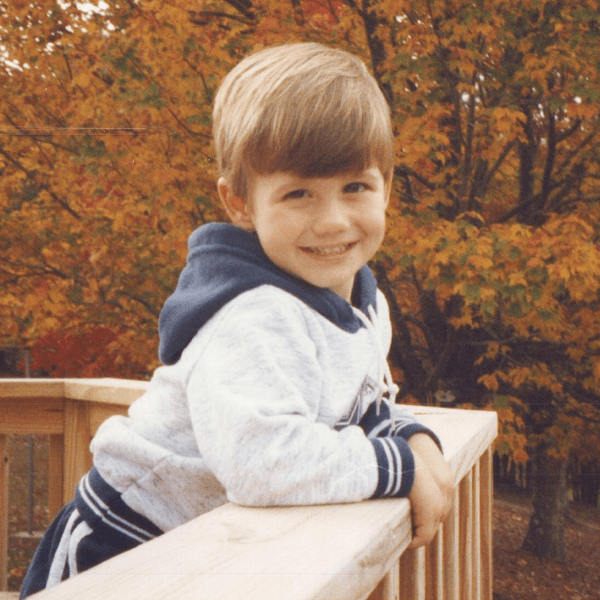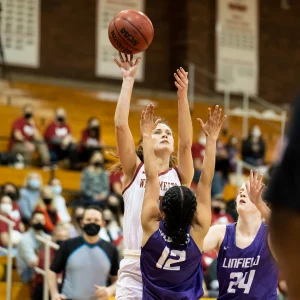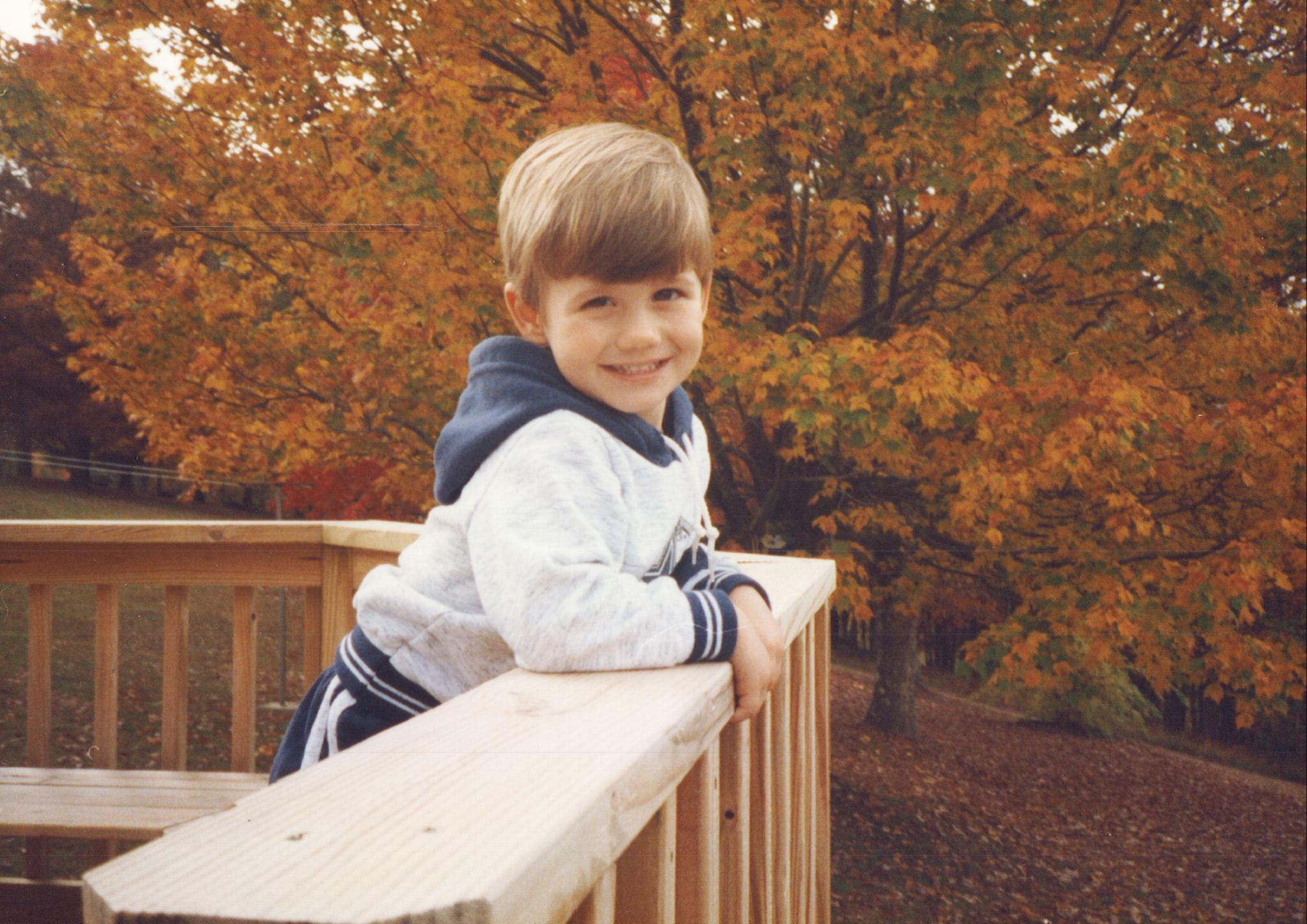
In the small town of Coeburn, Va., with about 1,400 residents, it’s fair to say that everyone knows everyone.
Case in point, when Labor Day Weekend comes around, residents gear up for Justin’s Walk. Neighbors wave to each other. Hugs and laughter abound.
Every September for the last 25 years, this close-knit community gathers to honor Justin Porter, a beloved child who battled an aggressive brain tumor and passed away at the age of six.
‘A Gregarious, Loving Child’
Justin Porter was born on Valentine’s Day in 1991. His mother, Gina Porter, described Justin as a gregarious child who wasn’t afraid to talk to anyone.
“He was very eager to please and liked making people happy. He loved everybody,” Gina said.
Justin had a fascination with trains, collecting toy models and eagerly watching real trains from his family’s storm door.
Gina said Justin’s younger brother Ryan looked up to him as a role model.
“I went down the hall one day and saw Justin showing Ryan how to make his bed,” Gina said. “The expression on Ryan’s face – he was so enthralled watching his big brother show him how to fix his pillows and make the bed. It was a sweet relationship.”
Justin was very thoughtful for his age and described by his teacher as an “old soul living in a young body.” Gina said Justin was a creative child who loved painting, art and writing poetry.
When he was five, Justin approached his mother who was making dinner and asked if she wanted to hear his first poem. Gina hurried to get a pen just in time to capture an incredible verse.
"Justin recited, 'Actually, it’s very clear... where there is no fear, there is no price to be paid. You just can’t be brave if you don’t have any fear.'"
Unbeknownst to Justin, he would soon become the epitome of bravery as he faced an unrelenting battle with brain cancer.
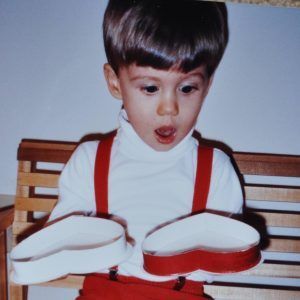
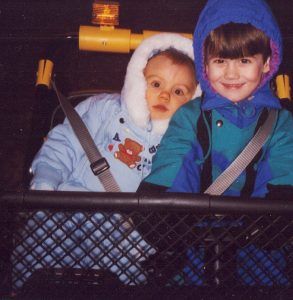
Searching for Hope
The Porter’s first noticed something was off when Justin’s eyes started to turn inward. After an ophthalmologist spotted something of concern, an MRI confirmed their worst fears: Justin was diagnosed with diffuse intrinsic pontine glioma (DIPG), a rare, cancerous brain tumor that occurs within the brainstem.
Each year, about 300 children are diagnosed with DIPG in the United States. This type of tumor is very difficult to treat and has a poor prognosis.
“We were told it was greater than one in a million that a child would face something like this,” Gina said. “But it doesn’t matter when you are the one.”
Knowing the challenges of his diagnosis, the Porter’s took Justin to Sutter Health in Sacramento. After a resection and biopsy, Justin’s tumor was diagnosed as grade 4 glioblastoma multiforme.
“[His surgeon] described the tumor as a mushroom with part of it on the outside but with a lot of the roots intermingled in the brainstem,” Gina said.
After surgery, Justin was taken to Duke to receive an experimental therapy called hyperfractionated radiation. This treatment involves breaking up a larger dose of radiation into smaller doses and giving it to the patient several times a day. “When you’re dealing with something like glioblastoma, you try whatever you can to see if it helps,” Gina said.
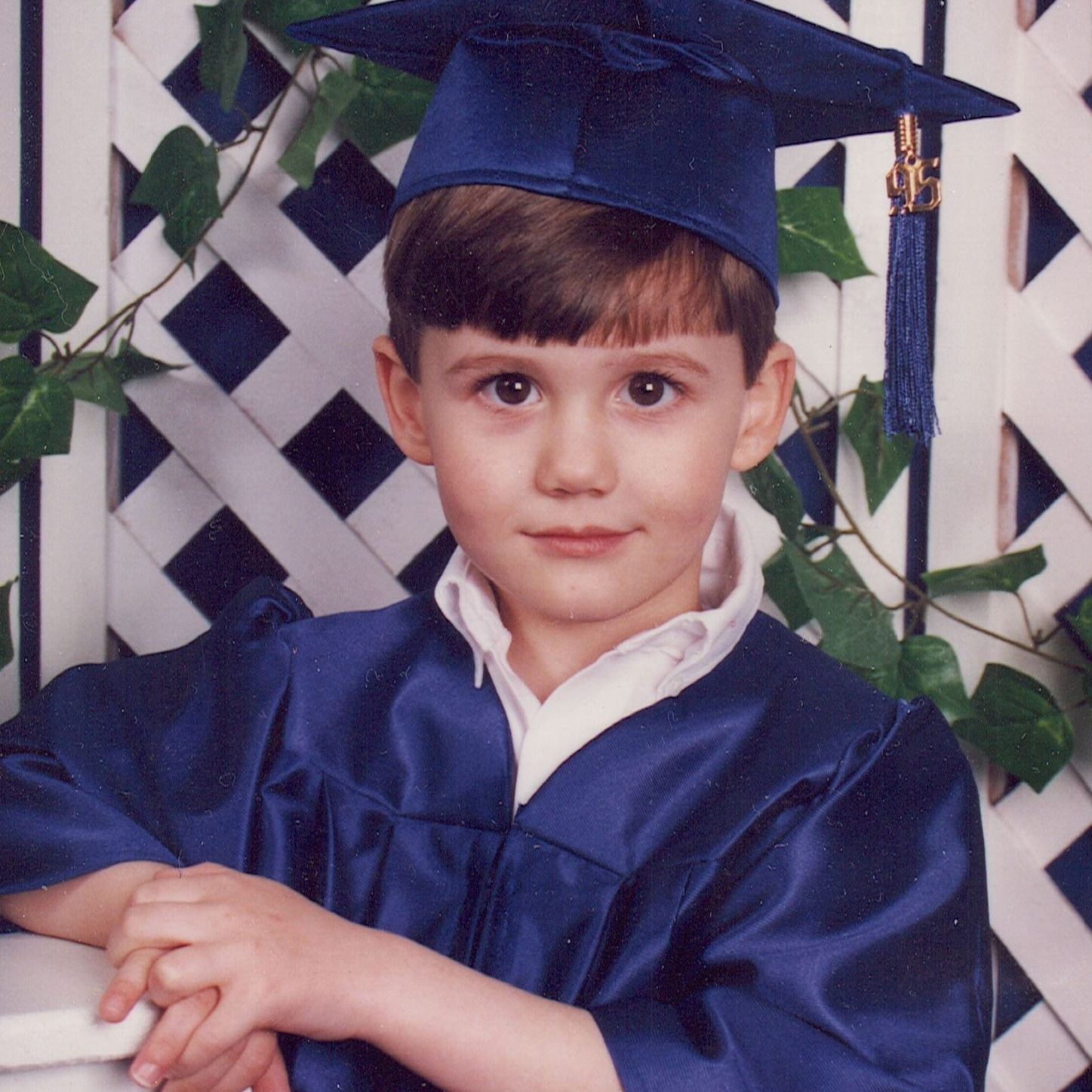
The treatment was successful enough to allow Justin to attend kindergarten in the fall — something he was thrilled about. Justin’s diagnosis prevented him from playing on the school’s tee-ball team, but he still would cheer on his team from the dugout.
“He loved kindergarten… it was like having story time all day long,” Gina said.
Justin later received a new chemotherapy treatment that Duke offered. He made it further than any other patient had on the treatment, but it eventually failed, and Justin had to drop out of school.
Making the most out of the circumstances, teachers brought Justin his homework so he could keep up from home.
The Porter’s installed a mechanical train around the ceiling of Justin’s room. His brother Ryan played on the floor next to Justin’s hospital bed so he could watch.
By May, Justin faced a cascade of neurological symptoms, including speech loss and limited muscle control. At this point, all treatment options had been exhausted. By July, Justin was bed-ridden and could only respond to yes or no questions by blinking.
“I should have known that the end was near,” Gina said, “but I think the Lord was protecting me because I didn’t.”
Justin passed away at 6:05 a.m. on Saturday, Aug. 30, 1997 – Labor Day Weekend. He was six years old.
Extending Justin’s Legacy
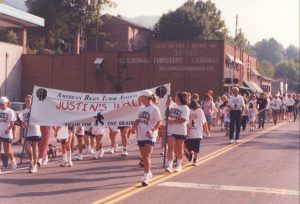
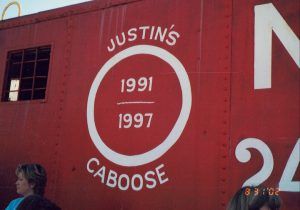
As the residents of Coeburn started to return to life as normal, Gina said she felt compelled to ensure Justin’s memory wasn’t forgotten.
“I wanted to keep him alive – not just in my heart, but within the community,” Gina said.
Gina decided to create a tribute walk, fittingly named “Justin’s Walk: Train for the Brain.” In November of 1998, residents gathered at the park’s red caboose and made their first walk through town to remember Justin.
Gina said she chose to donate proceeds from Justin’s Walk to the ABTA. She said the organization offered great educational resources that helped her family make treatment decisions. “My husband [Randy] is a chemist and I’m a pharmacist, and we were still completely overwhelmed!” Gina said.
The ABTA Fundraise Your Way program helps individuals create their own event to honor a loved one or celebrate a milestone while supporting critical brain tumor research and patient support services.
“This field of research doesn’t get the same amount of [federal] funding and attention as something that affects a large number of children,” Gina said. “But the outcomes are so much more severe that it really needs the funding.”
Gina said the surgery and radiation Justin received helped him live an extra year beyond his initial six-month prognosis.
“The problem with glioblastoma is that the prognosis is up to 18 months, which is good, but that’s still just 18 months,” Gina said.
Gina said she also wants Justin’s Walk to raise awareness about pediatric brain tumor symptoms. She said things like a lack of balance or headaches can be overlooked or easily dismissed as part of normal growth.
“If you don’t know the things to look for, then it easily can go undiagnosed and that’s when you get into a really bad prognosis,” she said.
Gina’s tireless dedication to Justin’s Walk event has helped fund more than $600,000 in brain tumor research grants and patient support services.
In 2011, the Porter’s received the ABTA’s highest honor, the Joel A. Gingras Jr. Award, given annually to an individual or organization who makes a significant contribution to the ABTA’s mission.
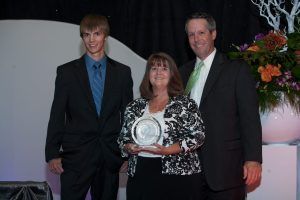
Celebrating Milestones
In early September, friends, family, and community members gathered at the red caboose to celebrate the 25th anniversary of Justin’s Walk.
Looking back, Gina said she’s amazed at how Coeburn has pulled together through rain, sunshine, and even the Covid19 pandemic.
“It makes a difference when it is a small community,” she said. “When tragedy strikes, it affects the whole community.”
Justin’s kindergarten best friend, Brett Hall, said Justin’s story is a staple that keeps the Coeburn community together.
“It’s hard to believe Justin lived to be six, and now, 25 years later, here we are,” said Brett Hall, Justin’s kindergarten best friend. “He’s still such an inspiration to us all.”
Family member Donna Noble said she’s witnessed all of the hard work throughout the years.
“The Porter’s have dedicated their lives to this walk and raising money for brain tumor research so other families don’t have to go through losing a child,” she said.
To wrap up the special anniversary, Coeburn Mayor Deventae Mooney surprised the Porter family with a resolution that formally recognizes Justin’s Walk.
“It makes a difference when it is a small community. When tragedy strikes, it affects the whole community.”
— Gina Porter
In part, the resolution reads:
“The Town Council of the Town of Coeburn wishes to formally recognize event organizer Gina Porter, the Porter family, and Justin’s Walk for the much-needed support for advancements in brain tumor research and brain tumor awareness, and to formally recognize the legacy of Justin Porter and the impact he has had and continues to have on so many lives.”
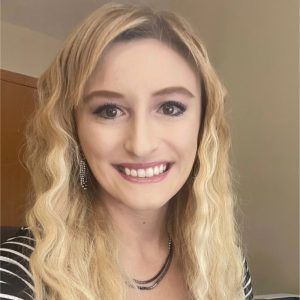
Jessie Schlacks
Jessie is Managing Editor of the bi-monthly e-newsletter MindMatters. Submit story ideas or questions to jschlacks@abta.org.


